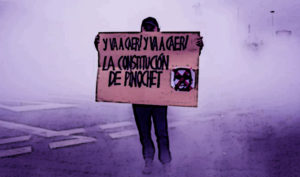While it is difficult for us to have a “government of the people”, we could at least aspire to it being “with the people” and “for the people”. Certainly, those who have reached La Moneda belong predominantly to a generation of young people from the university world and their main names recall the student leaders who led various mobilisations throughout the country in demand of a profound educational reform, as well as in solidarity with the diverse aspirations of the population. This was followed by the Social Outbreak.
There are governments in the past that included members of the so-called “working class” in the ministerial cabinet, sub-secretariats and other high public positions. But this is not the case, unless one considers the participation of some leaders or referents of the original peoples. In essence, this is truly the first parity administration, and that is where its greatest success lies. Some say that Boris heads the government of the millennials, alluding to the fact that many of its members were born between 1981 and 1993.
Chilean politics was becoming an ageing process, with the same people remaining in high public office for a long time, favoured by the very laws that were passed for this purpose, as well as the vices of their parties. In its history, the truth is that in our country and continent young leaders have always stood out among its main rulers and agents of change. The young age of all our liberators and great revolutionaries, as well as our most famous cultural and artistic exponents and many of our entrepreneurs and industrial pioneers, speaks for this. Processes such as the Revolution in Freedom and Popular Unity in the last century were indeed led by young politicians, progressive thinkers and social leaders.
Our institutions have always been honoured by the fluid access they guaranteed to the new generations, even if in the last post-dictatorship decades, the old guards have been so opposed to the general renewal of political actors and referents.
Experience should always be a good adviser to those who assume the office of governing. That is why it is an act of arrogance to leave out the former presidents from the solemn act in which a new Constitution is to be proposed. Even if those who predominate in the Constitutional Convention have just misgivings about the performance of those who preceded the current President, they should never have allowed themselves to be so grossly offended, especially if they intended their Magna Carta to be backed by a resounding majority in the next plebiscite.
More than a horror, this exclusion represents a manifestation of immaturity that makes many doubt the ideological soundness of those whose mission was to lay the foundations of what was defined as the “House of All”, that is, a democratic institutionality in which Chileans of all conditions could legitimise and extend over time.
This and other sectarian or foolish attitudes explain the enormous doubts that exist today among the population about approving or rejecting the proposed Magna Carta. It turns out that fewer people now seem to want a citizen’s verdict directed towards only two options. As the days go by, the desire grows stronger that, regardless of whether approval or rejection wins out, Chile should be given a new opportunity to amend and complement the text endorsed by the majority vote. In other words, that there will be a new Magna Carta in any case, even though its final drafting may fall to a new citizens’ body.
A year ago, practically everything augured a wide margin of citizen advantage in favour of approval; however, a few months later, there is no longer anyone who can say with certainty what the result of the Plebiscite in September will be, with the risk that the text will be approved or rejected for reasons that are beyond the scope and work of the 155 members of the Constitutional Convention.
With its option for “rejection” there seems to be no doubt that the opposition is seeking to repudiate what it considers to be the inanities of La Moneda, just as the ruling party is seeking unrestricted support for the new authorities with “approval”. Both, unfortunately, urge us to support or sanction the current government rather than to agree on a text that will provide us with a healthy and stable democratic coexistence. In the recent short-lived copper strike, we could see how little the workers’ support for President Boric lasted when they felt that a decision by the Executive could affect their interests. Few rulers have lost more supporters in so few days, according to the polls.
As things stand, it seems that we will face a dangerous and absurd dichotomy influenced by support or rejection of the current government rather than the possibility of giving us a good or an inconvenient Magna Carta. It is reasonable to think that the vast majority of citizens will not take into account the text proposed to them. In this way, what political advertising, the media and social networks do will also be very decisive. One of the fallacies of today’s Chile is the supposed civic spirit of its inhabitants. Otherwise, it would not have been necessary to agree on compulsory suffrage.










